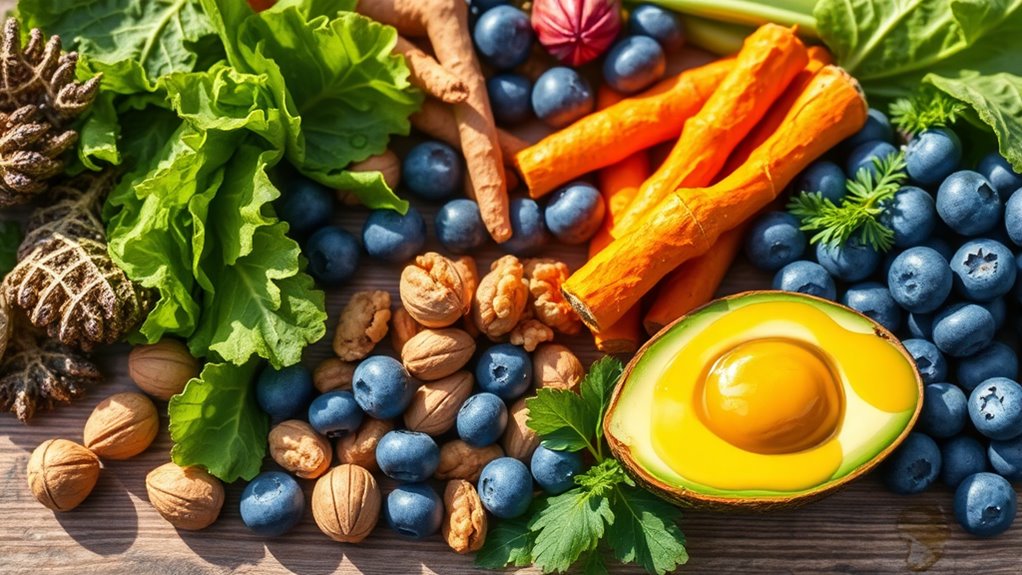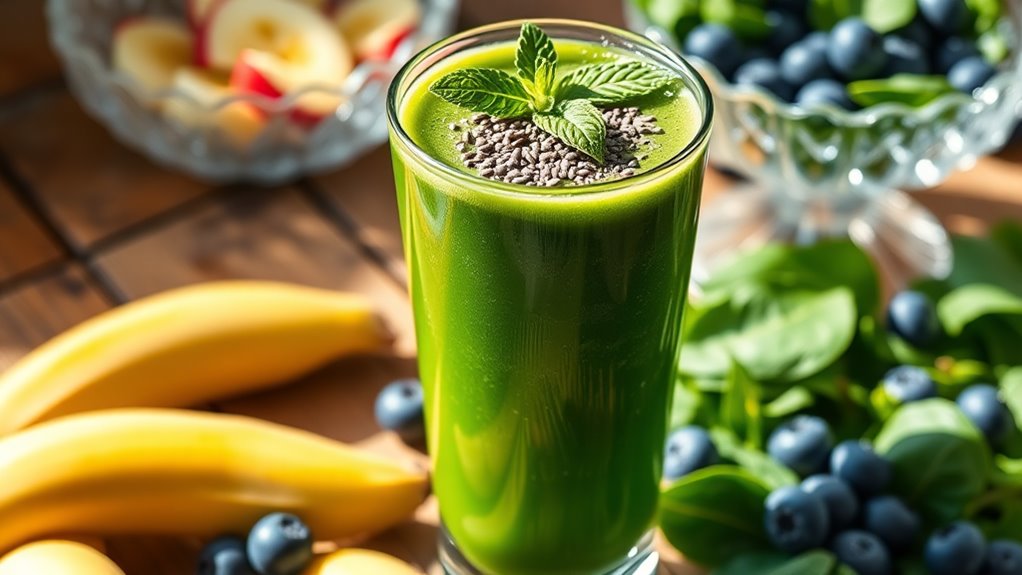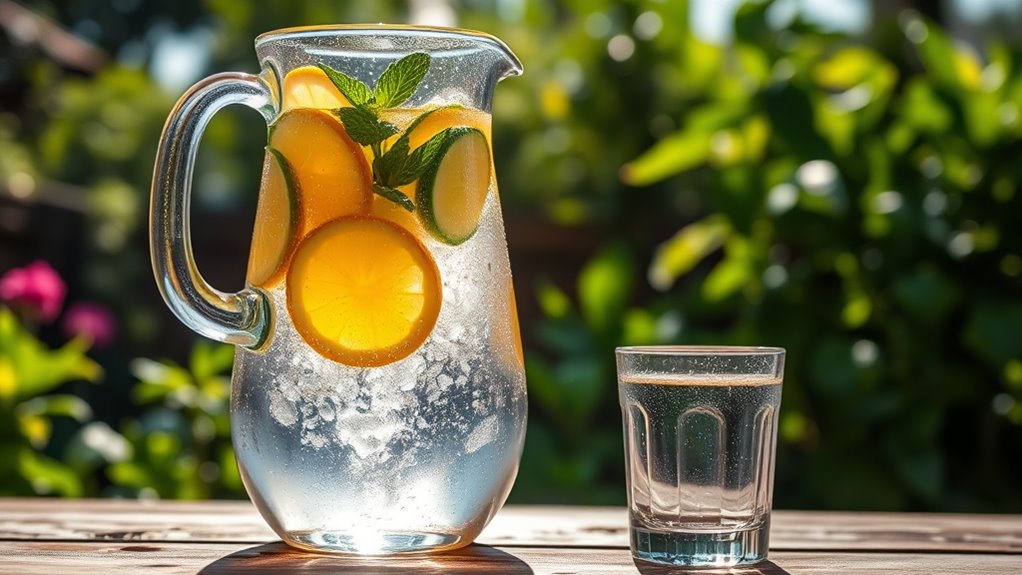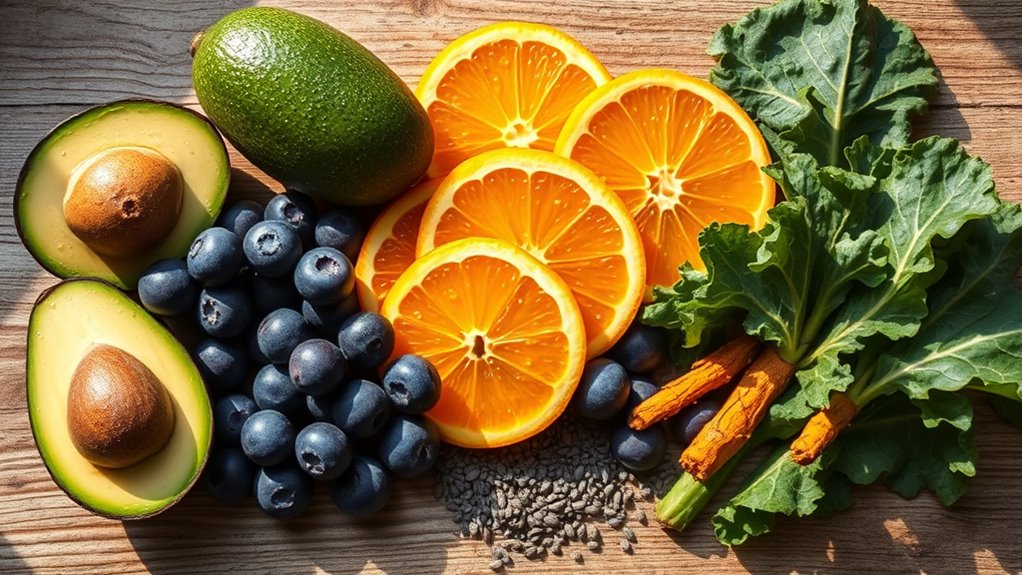Healing Foods That Help Fight Inflammation Naturally
Have you ever considered how your diet could be a powerful ally in fighting inflammation? Incorporating specific healing foods can significantly impact your health and well-being. Ingredients like turmeric, ginger, and omega-3-rich fish not only reduce inflammation but also enhance your immune system. Understanding these foods and how to incorporate them into your meals can set the stage for a healthier lifestyle. Let’s explore what these foods are and how they can make a difference in your life.
Understanding Inflammation and Its Effects on Health
What exactly is inflammation, and why should you care? Inflammation is your body’s natural response to injury or infection, but chronic inflammation can lead to serious health issues like heart disease and diabetes.
It’s essential to recognize signs of prolonged inflammation, such as fatigue and joint pain.
To combat this, you can turn to anti-inflammatory healing foods. Incorporating fruits, vegetables, nuts, and whole grains into your diet can help reduce inflammation and support overall health. Additionally, anti-inflammatory healing foods are rich in antioxidants and nutrients that further aid in fighting inflammation and promoting healing.
The Power of Antioxidants in Fighting Inflammation
Antioxidants play a crucial role in combating inflammation and promoting overall health. These powerful compounds neutralize free radicals, reducing oxidative stress that can lead to chronic inflammation.
By consuming antioxidant-rich foods, you can help your body lower inflammatory markers and support your immune system. Common sources include berries, dark leafy greens, nuts, and spices like turmeric.
Research shows that diets high in antioxidants are linked to a lower risk of inflammatory diseases. Additionally, incorporating transformative superfoods into your meals not only boosts your antioxidant levels but also enhances your overall well-being, making it easier to maintain a balanced, healthy lifestyle.
Top Healing Foods for Natural Inflammation Relief
When it comes to reducing inflammation naturally, certain foods can make a significant difference. Incorporating anti-inflammatory spices, omega-3 rich foods, and colorful fruits and vegetables into your diet can help combat inflammation effectively. Additionally, including healing superfoods in your meals can provide essential nutrients that further support your body’s health. Let’s explore these top healing foods and how they support your body’s health.
Anti-Inflammatory Spices
How can the spices in your kitchen help combat inflammation?
Spices like turmeric, ginger, and cinnamon pack powerful anti-inflammatory properties.
Turmeric contains curcumin, which has been shown to reduce markers of inflammation in numerous studies.
Ginger can help alleviate pain and swelling, while cinnamon may lower inflammatory cytokines.
Incorporating these spices into your meals not only enhances flavor but also supports your body’s natural defenses.
Sprinkle turmeric in soups, add ginger to smoothies, or use cinnamon in your morning oatmeal.
Omega-3 Rich Foods
Omega-3 fatty acids are some of the most powerful allies in your fight against inflammation. Found primarily in fatty fish like salmon, mackerel, and sardines, these healthy fats help reduce inflammatory markers in the body.
If you’re not a fish fan, consider incorporating flaxseeds, chia seeds, and walnuts into your diet.
Research shows that omega-3s can lower the risk of chronic diseases linked to inflammation, such as heart disease and arthritis.
Aim for at least two servings of omega-3-rich foods each week to harness their anti-inflammatory benefits. Your body will thank you for it!
Colorful Fruits and Vegetables
Incorporating a variety of colorful fruits and vegetables into your diet can significantly enhance your body’s ability to combat inflammation.
These foods are rich in antioxidants, vitamins, and minerals that help reduce inflammatory markers.
To boost your intake, focus on these four healing powerhouses:
- Berries – Packed with anthocyanins, they lower inflammation.
- Leafy Greens – Rich in vitamins A, C, and K, they support immune function.
- Bell Peppers – High in vitamin C, they help fight oxidative stress.
- Beets – Contain betalains, which have anti-inflammatory properties.
Make these vibrant foods a staple in your meals!
Incorporating Anti-Inflammatory Herbs and Spices
What if you could enhance your meals while also reducing inflammation? Incorporating anti-inflammatory herbs and spices is an easy way to do just that.
Turmeric, for example, contains curcumin, which studies show can significantly lower inflammation levels. Ginger’s compounds have similar effects, helping alleviate pain and swelling. Garlic not only adds flavor but also boosts your immune system. Cinnamon can help regulate blood sugar and reduce inflammation. Additionally, herbal teas for bloating relief can further support digestive health and reduce discomfort.
Start sprinkling these herbs and spices into your dishes, from soups to smoothies. By adding these powerful ingredients, you’ll not only elevate your meals but also promote better health.
Delicious Recipes to Embrace Healing Foods
Here are four delicious recipes to get you started:
- Turmeric Ginger Smoothie: Blend banana, spinach, turmeric, ginger, and almond milk for a refreshing anti-inflammatory boost.
- Quinoa Salad: Toss cooked quinoa with cherry tomatoes, cucumber, parsley, and a lemon-olive oil dressing.
- Roasted Veggie Bowl: Roast sweet potatoes, broccoli, and bell peppers, then drizzle with tahini sauce.
- Berry Chia Pudding: Mix chia seeds with almond milk and top with fresh berries for a nutritious snack.
Embracing healing foods doesn’t have to be complicated or bland; it can be a delightful journey for your taste buds. These nutrient-rich foods can significantly contribute to enhancing overall health while fighting inflammation. Enjoy the flavors while fighting inflammation!
Tips for Maintaining an Anti-Inflammatory Diet
How can you effectively maintain an anti-inflammatory diet in a world full of tempting processed foods?
Start by planning your meals.
Prioritize whole, unprocessed foods like fruits, vegetables, whole grains, nuts, and fatty fish.
Keep healthy snacks on hand, such as sliced veggies or mixed nuts, to avoid reaching for junk food.
Read labels to avoid added sugars and unhealthy fats.
Stay hydrated with water or herbal teas instead of sugary drinks.
Lastly, don’t forget to listen to your body—notice how certain foods impact your inflammation levels.
Small, consistent changes can make a big difference in your overall health.





